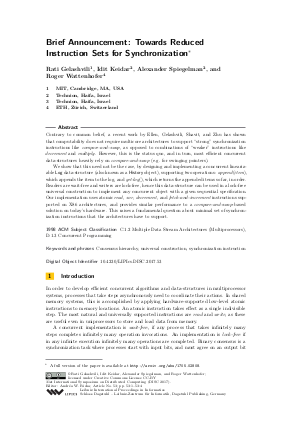Brief Announcement: Towards Reduced Instruction Sets for Synchronization
Authors Rati Gelashvili, Idit Keidar, Alexander Spiegelman, Roger Wattenhofer
-
Part of:
Volume:
31st International Symposium on Distributed Computing (DISC 2017)
Part of: Series: Leibniz International Proceedings in Informatics (LIPIcs)
Part of: Conference: International Symposium on Distributed Computing (DISC) - License:
 Creative Commons Attribution 3.0 Unported license
Creative Commons Attribution 3.0 Unported license
- Publication Date: 2017-10-12
File

PDF
LIPIcs.DISC.2017.53.pdf
- Filesize: 372 kB
- 4 pages
Document Identifiers
Subject Classification
Keywords
- Consensus hierarchy
- universal construction
- synchronization instruction.
Metrics
- Access Statistics
-
Total Accesses (updated on a weekly basis)
0PDF Downloads0Metadata Views
Abstract
Contrary to common belief, a recent work by Ellen, Gelashvili, Shavit, and Zhu has shown that computability does not require multicore architectures to support "strong" synchronization instructions like compare-and-swap, as opposed to combinations of "weaker" instructions like decrement and multiply. However, this is the status quo, and in turn, most efficient concurrent data-structures heavily rely on compare-and-swap (e.g. for swinging pointers). We show that this need not be the case, by designing and implementing a concurrent linearizable Log data-structure (also known as a History object), supporting two operations: append(item), which appends the item to the log, and get-log(), which returns the appended items so far, in order. Readers are wait-free and writers are lock-free, hence this data-structure can be used in a lock-free universal construction to implement any concurrent object with a given sequential specification. Our implementation uses atomic read, xor, decrement, and fetch-and-increment instructions supported on X86 architectures, and provides similar performance to a compare-and-swap-based solution on today's hardware. This raises a fundamental question about minimal set of synchronization instructions that the architectures have to support.
Cite As Get BibTex
Rati Gelashvili, Idit Keidar, Alexander Spiegelman, and Roger Wattenhofer. Brief Announcement: Towards Reduced Instruction Sets for Synchronization. In 31st International Symposium on Distributed Computing (DISC 2017). Leibniz International Proceedings in Informatics (LIPIcs), Volume 91, pp. 53:1-53:4, Schloss Dagstuhl – Leibniz-Zentrum für Informatik (2017)
https://doi.org/10.4230/LIPIcs.DISC.2017.53
BibTex
@InProceedings{gelashvili_et_al:LIPIcs.DISC.2017.53,
author = {Gelashvili, Rati and Keidar, Idit and Spiegelman, Alexander and Wattenhofer, Roger},
title = {{Brief Announcement: Towards Reduced Instruction Sets for Synchronization}},
booktitle = {31st International Symposium on Distributed Computing (DISC 2017)},
pages = {53:1--53:4},
series = {Leibniz International Proceedings in Informatics (LIPIcs)},
ISBN = {978-3-95977-053-8},
ISSN = {1868-8969},
year = {2017},
volume = {91},
editor = {Richa, Andr\'{e}a},
publisher = {Schloss Dagstuhl -- Leibniz-Zentrum f{\"u}r Informatik},
address = {Dagstuhl, Germany},
URL = {https://drops.dagstuhl.de/entities/document/10.4230/LIPIcs.DISC.2017.53},
URN = {urn:nbn:de:0030-drops-80201},
doi = {10.4230/LIPIcs.DISC.2017.53},
annote = {Keywords: Consensus hierarchy, universal construction, synchronization instruction.}
}
Author Details
References
-
Faith Ellen, Rati Gelashvili, Nir Shavit, and Leqi Zhu. A complexity-based hierarchy for multiprocessor synchronization:[extended abstract]. In Proceedings of the 35th ACM Symposium on Principles of Distributed Computing, 2016.

-
Maurice Herlihy. Wait-free synchronization. ACM Transactions on Programming Languages and Systems, 1991.

-
Adam Morrison and Yehuda Afek. Fast concurrent queues for x86 processors. In Proceedings of the 18th ACM SIGPLAN Symposium on Principles and Practice of Parallel Programming, volume 48 of PPoPP'13, pages 103-112, 2013.

-
David Patterson, Thomas Anderson, Neal Cardwell, Richard Fromm, Kimberly Keeton, Christoforos Kozyrakis, Randi Thomas, and Katherine Yelick. A case for intelligent ram. IEEE Micro, 17(2):34-44, 1997.

